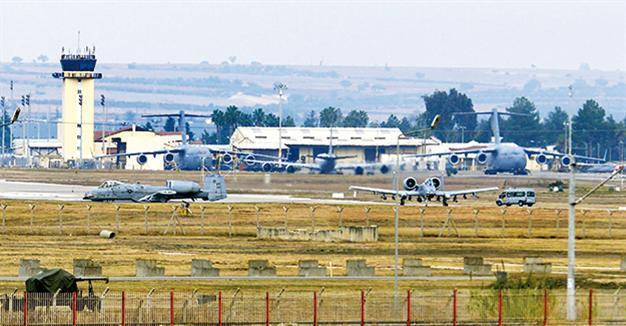Turkey back in anti-ISIL strikes after Russia deal
ANKARA

DHA photo
Turkish warplanes will actively participate in operations against the Islamic State of Iraq and the Levant (ISIL), Turkish Foreign Minister Mevlüt Çavuşoğlu said Aug. 11, after Turkey and Russia began to restore strained relations due to the downing of a Russian plane.
“If we do not terminate the terror organization right at the beginning, then they attack all the cells like an epidemic. Therefore, at this stage, we will once again actively join the operations against Daesh with our planes,” Çavuşoğlu told private broadcaster NTV in a televised interview on Aug. 11, using an Arabic acronym for ISIL.
The comments by Çavuşoğlu came as a Turkish delegation conducted talks in Russia aimed at coordinating actions on Syria and other bilateral issues following Turkish President Recep Tayyip Erdoğan’s first face-to-face meeting with Russian President Vladimir Putin on Aug. 9 in St. Petersburg after Turkey downed a Russian fighter jet along its border with Syria on Nov. 24, 2015.
Çavuşoğlu also called on Russia to carry out joint operations against ISIL.
“We will discuss all the details. We have always called on Russia to carry out anti-Daesh operations together,” he said, adding that the proposal was still “on the table.”
He urged Russia to fight against the “common enemy” of ISIL jihadists in Syria.
“Let us come together to concentrate our efforts on Daesh,” he said.
The minister said there were currently no restrictions on U.S.-led coalition forces’ operations in the fight against the jihadist group in the aftermath of the failed coup attempt of July 15.
He also added that the rules of engagement along the border had been brought into line with those of NATO, saying they were in effect for anyone.
Meanwhile, Russia said on Aug. 10 that there would be daily three-hour cease-fires in Syria’s Aleppo starting Aug. 11 to allow humanitarian convoys to enter the city safely, a proposal which the United Nations said it would consider.
Aleppo is split into rebel- and government-controlled areas. The rebel-held east, where about 250,000 people are thought to be living, came under siege in early July after government forces cut the Castello Road, the main supply route into the district.
Last week rebels staged a major assault southwest of Aleppo to break this siege. Rebel fighters did manage to pierce the ring of government-controlled territory, but a safe corridor for civilians and aid has not yet been established as fierce fighting continues.
Speaking in a televised briefing, Lt.-Gen. Sergei Rudskoi, a senior Russian Defense Ministry official, said the pause in fighting would run from 10 a.m. to 1 p.m. local time.
Rudskoi said the question of joint control over the delivery of humanitarian aid via Castello Road was being discussed with the United Nations and the United States.
He said “all military action, air and artillery strikes” would be halted for the three-hour periods.
“This is to ensure that all interested organizations have the opportunity to deliver their humanitarian assistance to the residents of Aleppo,” Rudskoi said.
He added that Russia, an ally of Syrian President Bashar al-Assad against rebels in Syria’s five-year-old civil war, would work with Damascus to ensure safe delivery of the aid.
On Aug. 11, Russian air strikes on the ISIL bastion of Raqqa in northern Syria killed at least 30 people, including 24 civilians, the Syrian Observatory for Human Rights said.
A barrage of rocket fire from Syrian rebels killed at least 14 people and left dozens wounded Aug. 10 in government-held neighborhoods of Aleppo, Syrian state media said.
Air strikes killed at least 19 people and wounded dozens in rebel-held Idlib province, southwest of Aleppo, on Aug. 10.
Meanwhile, the top U.S. commander for the fight against ISIL coalition, Lt. Gen. Sean MacFarland, said Aug. 10 that the military campaigns in Iraq and Syria had taken 45,000 enemy combatants off the battlefield.
MacFarland said the number and quality of ISIL fighters was declining and could be as low as about 15,000.
He says it is difficult to determine accurate numbers, but that estimate is lower than the 19,000 to 25,000 fighters that officials cited earlier this year.
